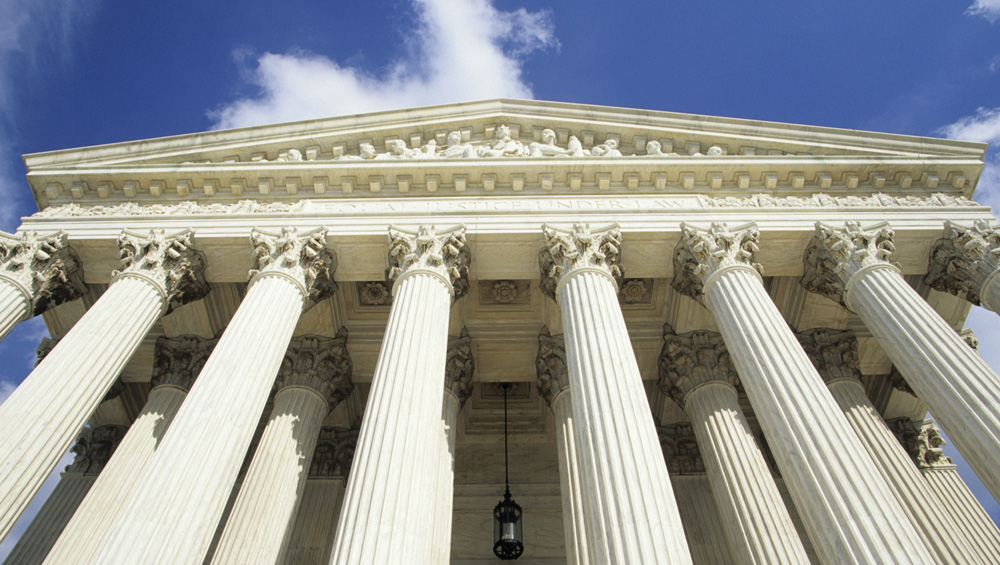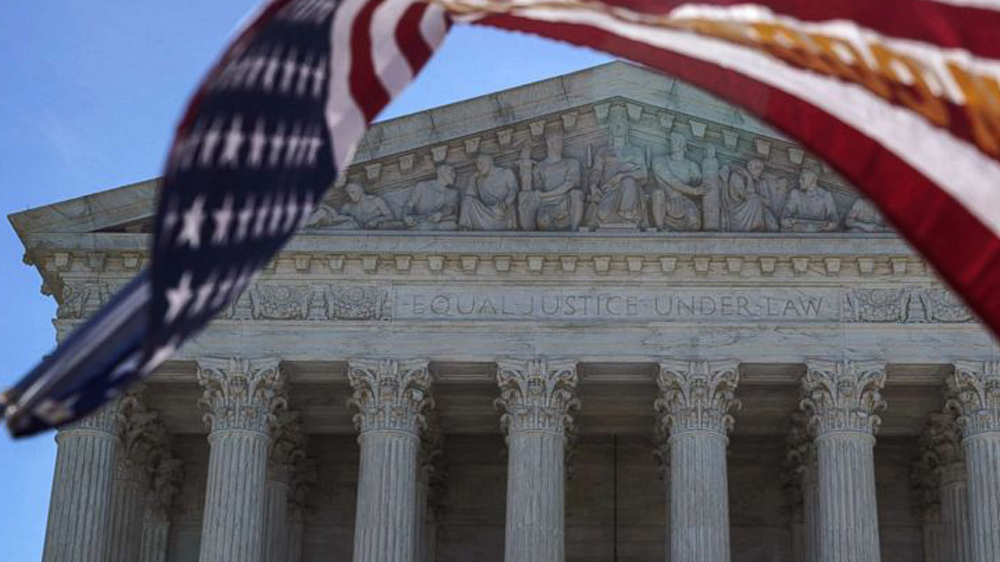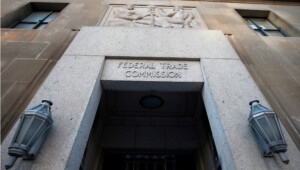
A bipartisan group of senators is looking to bring the Supreme Court to television, aiming to have the high court reach a new technological frontier after nearly a year of hearing arguments via teleconference due to the coronavirus pandemic. Senate Majority Whip and Judiciary Committee Chair Dick Durbin and Sen. Chuck Grassley, the committee’s top Republican, introduced a bill on March 18 that would require the Supreme Court to allow public court proceedings to be televised.

The future of the local TV industry could very well come down to who wins Tuesday’s election between President Donald Trump and Joe Biden. Early next year, the Supreme Court will decide on a decades-old legal battle centered around the FCC’s attempts to make local media ownership rules less restrictive. The result could have a far-reaching impact on one of the oldest businesses in the TV industry.

In a blow to web monitoring service TVEyes, the Supreme Court has refused to review a lower court ruling that requires the company to stop offering video clips from Fox News programs.

Judge Brett Kavanaugh says he will keep an open mind about allowing cameras or microphones into the Supreme Court, but signaled he might be more receptive to televising the reading of decisions than oral arguments.
In the wake of the June 25 Supreme Court decision, the online distributor of broadcast signals is taking a new legal tack: it’s a cable system and entitled to the compulsory license just like any conventional cable system. In making the argument, Aereo cites the high court’s finding that Aereo is “for all practical purposes” a cable system. Arguing for an immediate injunction against Aereo, broadcasters said Aereo’s new argument is “astonishing,” given its past insistance that it was not a cable system.
Aereo’s Got A Rocky Legal Path Ahead
 If the Supreme Court rules against Aereo on the transmission issue, the Aereo story could come to a relatively abrupt end, but if it doesn’t, Aereo still faces serious legal hurdles ahead. In either case, the Supreme Court’s decision on the transmission issue is not likely to be the “one and done” referendum that Aereo might have hoped for. Stated differently, if the Supreme Court decision does turn out to be “one and done,” it will be Aereo that is done.
If the Supreme Court rules against Aereo on the transmission issue, the Aereo story could come to a relatively abrupt end, but if it doesn’t, Aereo still faces serious legal hurdles ahead. In either case, the Supreme Court’s decision on the transmission issue is not likely to be the “one and done” referendum that Aereo might have hoped for. Stated differently, if the Supreme Court decision does turn out to be “one and done,” it will be Aereo that is done.
In a motion to intervene, Alki David’s company says that it will be impacted by the high court’s ruling, but that the streaming service has an “incentive” not to represent its interest.
What Happens To Broadcasting If Aereo Wins?

ABC-Aereo Set For Supreme Court Showdown
 The copyright infringement case has moved to the High Court. Here’s a look at the case’s quick timing, the filing of friend of the court briefs, the parties and their arguments, and a little “tea leaf reading” of current Supreme Court justices’ prior positions in cases that might influence their perspective.
The copyright infringement case has moved to the High Court. Here’s a look at the case’s quick timing, the filing of friend of the court briefs, the parties and their arguments, and a little “tea leaf reading” of current Supreme Court justices’ prior positions in cases that might influence their perspective.
 The Supreme Court opts to use the broadcasters’ formulation of the question to be resolved by the court. So if you’re sizing up the odds before placing your bets on the case, you should be aware that, to the extent that the “question presented” may provide a possible soupçon of a hint of the Court’s leaning, the broadcasters may have won the first round.
The Supreme Court opts to use the broadcasters’ formulation of the question to be resolved by the court. So if you’re sizing up the odds before placing your bets on the case, you should be aware that, to the extent that the “question presented” may provide a possible soupçon of a hint of the Court’s leaning, the broadcasters may have won the first round.
Why Aereo Is Not The New Betamax Case
 The Supreme Court on Friday announced that is has decided to review the decision of a US Appeals Court in New York finding that the Aereo service of retransmitting over the Internet the signals of local television stations, without permission from or payment to those stations, was legal. One newspaper editorial, from the Los Angeles Times, has suggested that this is a Betamax case for the 21st century. But the issue will be who is doing the performance, not a fair use decision as in the Betamax case.
The Supreme Court on Friday announced that is has decided to review the decision of a US Appeals Court in New York finding that the Aereo service of retransmitting over the Internet the signals of local television stations, without permission from or payment to those stations, was legal. One newspaper editorial, from the Los Angeles Times, has suggested that this is a Betamax case for the 21st century. But the issue will be who is doing the performance, not a fair use decision as in the Betamax case.
 Broadcasters will get a U.S. Supreme Court hearing in their fight to stop Aereo Inc., the company that is threatening the industry’s decades-old business model by selling live television programming over the Internet. The justices today agreed to hear an appeal by media companies including ABC, Fox, NBCUniversal and CBS.
Broadcasters will get a U.S. Supreme Court hearing in their fight to stop Aereo Inc., the company that is threatening the industry’s decades-old business model by selling live television programming over the Internet. The justices today agreed to hear an appeal by media companies including ABC, Fox, NBCUniversal and CBS.
The Supreme Court will get its first chance to decide whether to hear the networks’ case against Aereo on Jan. 10. That’s when the court will meet to decide what cases to hear in 2014, according to the court’s docket. Their decision could be announced as early as the following Monday.
“Make no mistake about it,” broadcasters tell the Supreme Court. “Aereo is not a hardware supplier. It offers a subscription service.”
Aereo will not fight broadcasters’ motion to have the Supreme Court hear their case against the streaming company. In a statement today, founder and CEO Chet Kanojia said he hoped the Supreme Court would decided the case on its merits. The court has not yet decided whether it will hear the networks’ case.

 The National Football League and Major League Baseball are urging the Supreme Court to grant broadcasters’ petition to hear their challenge to the legality of Aereo, the startup that features unauthorized streams of local broadcast signals. After the TV networks filed a petition to the high court last month, the NFL and MLB filed an amicus brief last week arguing that if Aereo prevails, it would mean sports programming would likely migrate to cable. Broadcasters argue that Aereo undermines their ability to collect retransmission fees from cable and satellite operators.
The National Football League and Major League Baseball are urging the Supreme Court to grant broadcasters’ petition to hear their challenge to the legality of Aereo, the startup that features unauthorized streams of local broadcast signals. After the TV networks filed a petition to the high court last month, the NFL and MLB filed an amicus brief last week arguing that if Aereo prevails, it would mean sports programming would likely migrate to cable. Broadcasters argue that Aereo undermines their ability to collect retransmission fees from cable and satellite operators.
 Online video company Aereo “threatens the existence of the American broadcast industry as the nation has come to know it,” the Media Institute says in papers filed this week with the Supreme Court. The nonprofit think-tank is asking the Supreme Court to hear broadcasters’ challenge to earlier rulings allowing Aereo to continue operating.
Online video company Aereo “threatens the existence of the American broadcast industry as the nation has come to know it,” the Media Institute says in papers filed this week with the Supreme Court. The nonprofit think-tank is asking the Supreme Court to hear broadcasters’ challenge to earlier rulings allowing Aereo to continue operating.
 Disney, CBS, NBCUniversal, WNET New York, Fox and Univision today asked the high court to review a ruling by the U.S. Courts of Appeals in New York. That court rejected broadcasters’ plea to shut down Aereo during a trial to determine whether the streaming service infringes on their copyrights.
Disney, CBS, NBCUniversal, WNET New York, Fox and Univision today asked the high court to review a ruling by the U.S. Courts of Appeals in New York. That court rejected broadcasters’ plea to shut down Aereo during a trial to determine whether the streaming service infringes on their copyrights.
Viewers can stream over-the-air TV services like Aereo in New York but not California. The case could go to the Supreme Court — but not until 2015 or later, leaving consumers ample time to get to know the new service.
The Case For A Supreme Court Media Pool
 As an institution, the Supreme Court needs to better explain itself, and the law, and the justice system, to its constituents. No one can teach basic constitutional principles than the justices. No one can help educate the American people about the glory of the law better than the highest judges in the land. Transcribing and recording their public remarks to ensure that there is a complete record, making it easier for reporters to get accurate quotes in context, is the easiest, safest way for them to do so. Every speech. Every justice. The American people deserve it.
As an institution, the Supreme Court needs to better explain itself, and the law, and the justice system, to its constituents. No one can teach basic constitutional principles than the justices. No one can help educate the American people about the glory of the law better than the highest judges in the land. Transcribing and recording their public remarks to ensure that there is a complete record, making it easier for reporters to get accurate quotes in context, is the easiest, safest way for them to do so. Every speech. Every justice. The American people deserve it.
The latest legal defeat for big TV broadcasters against the start-up company Aereo could lead to a Supreme Court showdown over the public’s ability to get free television signals.
 The broadcaster’s desire to shut Aereo down could end up at the Supreme Court. After its bid for rehearing of its copyright infringement case at an appeals court was turned down today, Fox said: “The Second Circuit’s denial of our request for an ‘en banc’ hearing, while disappointing was not unexpected. We will now review our options and determine the appropriate course of action, which include seeking a hearing in the U.S. Supreme Court and proceeding to a full trial on the merits of the case.”
The broadcaster’s desire to shut Aereo down could end up at the Supreme Court. After its bid for rehearing of its copyright infringement case at an appeals court was turned down today, Fox said: “The Second Circuit’s denial of our request for an ‘en banc’ hearing, while disappointing was not unexpected. We will now review our options and determine the appropriate course of action, which include seeking a hearing in the U.S. Supreme Court and proceeding to a full trial on the merits of the case.”
 The Supreme Court narrowly ruled in favor of Comcast on Wednesday, holding that a group of its Philadelphia area subscribers claiming they were overcharged could not sue the cable operator in a certified class action.
The Supreme Court narrowly ruled in favor of Comcast on Wednesday, holding that a group of its Philadelphia area subscribers claiming they were overcharged could not sue the cable operator in a certified class action.
 The Supreme Court without comment rejected attempts to overturn two big entertainment cases on Monday. In one, TV networks and TV station owners won a court order that effectively shut down pay-TV service ivi’s effort to offer viewers TV signals over the web without paying broadcasters retransmission fees.
The Supreme Court without comment rejected attempts to overturn two big entertainment cases on Monday. In one, TV networks and TV station owners won a court order that effectively shut down pay-TV service ivi’s effort to offer viewers TV signals over the web without paying broadcasters retransmission fees.
Justices on Wednesday said the Securities and Exchange Commission must file suit within five years of an alleged fraudulent security action, but that the SEC can’t start the clock running whenever it discovers a bad practice. This clarifies that the FCC cannot go to court to collect an indecency forfeiture unless it commences that action within five years after the broadcast, or if the broadcaster waives the statute of limitations.
On Monday, the high court declined to hear a class-action suit against several big media companies including Comcast, News Corp. and Time Warner over how they bundle their cable channels for sale to pay TV distributors.
Two class-action disputes divided the U.S. Supreme Court on Monday as companies looked to build on the victory won last year when the justices threw out a nationwide sex-bias suit against Wal-Mart Stores Inc. In one, the court’s Republican-appointed majority questioned efforts to press an antitrust suit against Comcast Corp. Comcast is seeking to stop an antitrust suit that seeks $875 million on behalf of as many as two million Philadelphia-area customers.
A federal court judge’s decision to side with Comcast and not enforce a tentative settlement in a class-action lawsuit will set the stage for arguments before the Supreme Court. Behrend v. Comcast, originally filed in 2003, alleges that Comcast’s “clustering” of systems through swaps with other cable operators had given the media giant too much power to increase cable rates and exclude competitors in the Philadelphia area.
 The Supreme Court on Friday refused to review a lower court decision that threw out the FCC’s $550,000 fine for CBS over Janet Jackson’s “wardrobe malfunction” during the network’s live coverage of the 2004 Super Bowl. The high court’s rejection of the Obama Administration’s appeal means the agency now may have to come up with a refund for the network — which already paid the record fine.
The Supreme Court on Friday refused to review a lower court decision that threw out the FCC’s $550,000 fine for CBS over Janet Jackson’s “wardrobe malfunction” during the network’s live coverage of the 2004 Super Bowl. The high court’s rejection of the Obama Administration’s appeal means the agency now may have to come up with a refund for the network — which already paid the record fine.
In a blow to broadcasters, the Supreme Court Friday declined to review a lower court ruling blocking an FCC decision that would have loosened regulations and allowed firms to own both newspapers and television stations in the same market.
A divided U.S. Supreme Court threw out Montana’s ban on corporate campaign spending in a reaffirmation of the 2010 decision that unleashed super-PACs and left federal elections awash in money from big spenders.
Kicking The Indecency Can Down The Road
In a unanimous decision, the U.S. Supreme Court ruled that it would like to have as little to do with the FCC’s broadcast indecency policy as possible. Rather than the momentous ruling on the constitutional future of broadcast indecency enforcement that advocates on all sides of the issue had hoped for, the mighty sound of the court punting on the constitutional issue reverberated throughout Washington. Unfortunately, by putting that decision off until another day, the Court leaves the waters of FCC indecency enforcement as murky (and chilling) as ever.
Supreme Court Throws Out ‘Fleeting’ Fines
 The Supreme Court today concluded only that broadcasters could not have known in advance that obscenities uttered during awards show programs and a brief display of nudity on an episode of ABC’s NYPD Blue could give rise to FCC sanctions. But the justices declined to issue a broad ruling on the constitutionality of the FCC’s indecency policy.
The Supreme Court today concluded only that broadcasters could not have known in advance that obscenities uttered during awards show programs and a brief display of nudity on an episode of ABC’s NYPD Blue could give rise to FCC sanctions. But the justices declined to issue a broad ruling on the constitutionality of the FCC’s indecency policy.
The Supreme Court today vacated the FCC’s rules on “fleeting expletives” and brief nudity, saying it had not given networks adequate notice of its policies and that they were overly vague. It ducked a decision on the broader issue of the constitutionality of the indecency rules.
The Supreme Court heard arguments back on Jan. 10 in FCC v. Fox Television Stations, a case testing the constitutionality of the commission’s ban on indecent words and images on TV, and court watchers are curious. What the &#@$ is taking so long?
The FCC has filed a petition seeking a Supreme Court review of its loss in the Third Circuit in its Janet Jackson Super Bowl wardrobe malfunction case against CBS.
What the [fleeting expletive] is Supreme Court Associate Justice Samuel Alito thinking? Midway through the argument last Tuesday on the constitutionality of the FCC’s broadcast indecency restrictions, Alito says: “Well, […]
High Court Weighs FCC Indecency Policy
The Supreme Court justices engaged in colorful give-and-take today with lawyers for the government and television networks over government regulation of the airwaves during hours when children are likely to be watching.
The broadcast industry will try next week to persuade the Supreme Court to tell the government to back off when it comes to regulating content. On Tuesday, the high court will hear arguments from News Corp.’s Fox and Walt Disney Co.’s ABC that the FCC’s rules regarding indecent programming and the way they are enforced by the agency are both vague and unconstitutional.









































